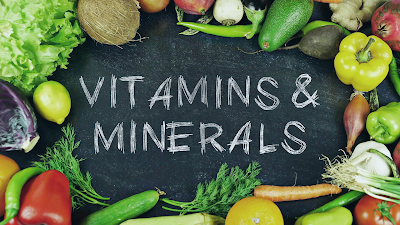Most common symptoms of vitamins and minerals deficiencies
This article is about the deficiencies of some vitamins and minerals and this might be one of the reasons for some diseases or symptoms and you must know that any symptoms are signals that your body gives you to warn you about a problem or there is a lack in a particular mineral or vitamin.
When you have to take any vitamin or mineral supplement?
Here is a list of the most important and common symptoms which are directly related to the deficiency of some vitamins and minerals:
Vitamin C:
If you are suffering from bleeding gums after brushing your teeth, frequent herpes, and viral infections, like cold and flu, these all are signs of vitamin C deficiency.
Vitamin C is one of the essential vitamins because the body does not synthesize it and it is important for the support of your immune system, your skin and joints, and vitamin C is a strong antiviral.
The natural sources of vitamin C are sardines, vegetables, citrus fruits like orange and tangerine, and bell peppers.
Vitamin A:
If you have dry skin and blurred vision, and especially at night, redness and dryness of your eyes and skin. These are of the common symptoms of vitamin A deficiency.
The natural sources of vitamin A are cod liver oil, carrots, eggs, and beef liver.
Vitamin E:
If you are suffering from lack of feeling in your feet, frequent eczema, reduced skin glow
lack of balance, frequent abortions, infertility problems, this might be a sign of a deficiency of vitamin E.
Vitamin E is a strong antioxidant that is important to get rid of free radicals in the body.
The good sources of vitamin E are nuts, seeds, vegetables, and olive oil.
Vitamin D:
If you are feeling depressed for no reason, constipated, and you have chronic fatigue, lack of energy, excessive sweating, hair loss, and hormonal imbalance.
Direct exposure to the sunlight daily for 20 minutes is the best natural source to get your recommended daily dose of vitamin D and your face, shoulders, chest, and legs should be exposed to direct sunlight.
Vitamin D is found in animal fat like butter, ghee, and cod liver oil.
Vitamin B1 (Thiamine):
Blurred vision, dry eyes, swollen legs, and frequent white spots on the nails, esophageal reflux, cognitive problems concerning your concentration and memory.
Vitamin B1 is found in nuts, beef liver, red meat, and oats.
Vitamin B2 (Riboflavin):
Skin rash, chapped lips, mouth and tongue ulcers, hair loss, tongue, and eyes redness, are the most common symptoms of vitamin B2 deficiency.
The natural sources of vitamin B2 are eggs, nuts, asparagus, and broccoli.
Vitamin B6:
The common signs of a deficiency of vitamin B6 are redness around the nose and the cheeks only, eczema on your face, digestive disorders, very dry skin.
The good sources of vitamin B6, are fish, eggs, chicken, and vegetables.
Vitamin B12:
Memory and concentration problems, nervous system disorders, numbness in your hands and feet, your nails become darker and turn into a brownish color, pale skin color, weak immunity, and anemia.
All of these symptoms are the most common for vitamin B12 deficiency and It is found only in animal sources of food.
You must know the gut microbiome is important for the absorption of vitamin B12 and the gut microbiome must be well balanced.
Selenium:
Unjustified muscle pain, lack of energy, a high level of iron in the blood, thyroid gland dysfunction, autoimmune diseases, these are the most common symptoms of selenium deficiency.
You will have a lack of selenium if your diet was free of red meat, eggs, shellfish, and nuts.
Zinc:
Some of the common symptoms related to zinc deficiency are white spots on your fingernails, a reduced sexual desire, weak stomach acid, for men beard hair falling and thinning, and losing muscle mass.
Zinc is important for sex hormones in men and women.
The highest amount of zinc in food are shellfish, meat, seeds, nuts, dairy, grain, and eggs.
Magnesium:
A higher level of stress, constipation, muscle cramps, and insomnia, these symptoms are signs of magnesium deficiency.
Magnesium is important for your heart, blood vessels, muscles, your blood pressure, and your nervous system.
The good sources of magnesium are green vegetables, avocados, and seeds.
Iodine:
If you wake up, and your eyes are puffy, if you are gaining weight without any reason, losing your hair, if you have a lack of energy, hypothyroidism, all of these are symptoms of iodine deficiency
Iodine is found in seaweed, fish, and shrimps.
Iron:
Pale skin color, white nails, hair loss, frequent common cold, loss of muscle mass and ear beeps are all signs of iron deficiency.
The most important sources of iron are red meat, dairy, eggs, beef liver, and plant protein from whole grains such as lentils, and beans.
We hope that this information was clear enough to help you understand the signs that your body gives you in case of any lack of vitamins and minerals...

Post a Comment